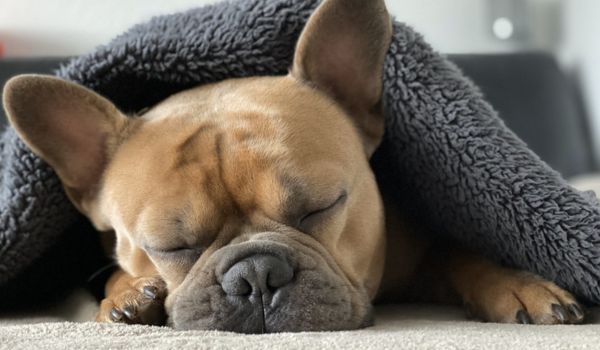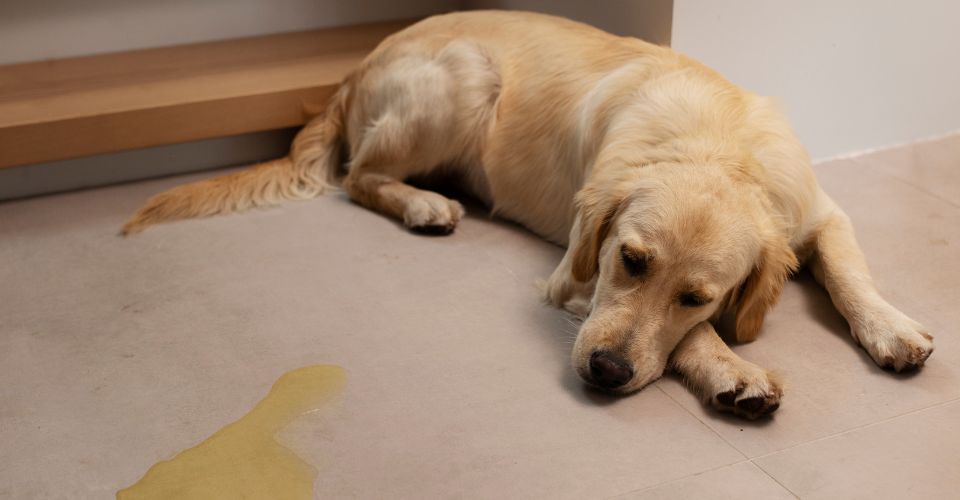Are dogs light sleepers? Well, when you sleep next to your canine, you could surely say that your dog loves taking a nap. But you might also notice that he always seems to be aware of his surroundings. This points out that he might be slumbering only lightly. But is it the case for sure? Let us dig deeper.
Are Dogs Light Sleepers?
Yes—by nature, dogs are light sleepers. Dogs sleep lightly to stay alert about what is happening around them. They are highly protective of their family and pack members. Sleeping lightly allows them to sense the imminent danger and react before it is too late.
Dogs have wolf ancestry. Like many other carnivores, wolves are highly protective of their packs. This pretty much explains why our canine friends are also very careful when it comes to their families. They are alert while asleep, and even slight disturbances can wake them in no time.
This quality has elevated some of them to the level of guard dogs. Dogs take polyphasic naps, and even in those sleeping sessions, they are sleeping only lightly—meaning that they are fully aware of any intruder or suspected person barging into their territories.
What Other Factors Can Make a Dog Sleep Lightly?
The ‘light sleeping nature’ in dogs is not entirely instinctual. Some other factors added to their lives later can also make them more alert while they sleep. Some are constructive, while others are not so good for the dog’s well-being.
Alertness Training
Training a dog to stay alert and attentive to its surroundings can lead to lighter sleep. If the training involves waking up instantly on command, it can have a further impact. Such kind of training is usually suitable for service, police, or military dogs. Dogs are naturally alert; such training sessions only hone this quality.
Anxiety and Stress
Mental stress can prevent sound sleep in dogs. As the overall sleeping patterns change, a dog will have a hard time taking a peaceful nap. If that is the case, the dog may suffer from other conditions as well, such as barking excessively. Several possibilities can lead to mental disturbance in dogs. Common among them include separation anxiety, loud noises, or a new pet in the house.
Sensory Overload in Dogs
Sensory overload is a condition in dogs in which they become very sensitive to all external stimuli, which can impact their sleeping patterns.
Physical Issues
As in the case of mental problems, physical issues such as pain or any other discomfort can also lead to a lack of sleep. Being in pain, it could become impossible for the dog to have a deeper nap. Common problems include arthritis, joint pains, kidney diseases, fleas, and frequent urination.
Old Age
Old dogs have a tough time having a sound sleep. It usually happens because they are more prone to having diseases and associated pains. Sleeping patterns can be affected by deteriorating bone conditions and other illnesses that a dog may develop with aging. They will have more bursts of fear, anxiety, and stress that can eventually lead to interrupted sleep patterns.
Do Dogs Ever Sleep Deeply?
Yes, dogs do deeply sleep when they enter the fourth stage of their slumber, i.e., the Rapid Eye Movement (REM) phase. Dogs go through four different stages when they sleep, with the level of unconsciousness increasing at each stage. Sleep is the deepest in the fourth and final stages, but it is only ten percent of the total slumber.
How to Help Your Dog Sleep Deeply?
You can provide your pooch with various amenities and proper schedules to help him sleep deeply. The key is to make sure nothing interrupts his peaceful dreams. To do it, make sure he has gone potty on regular timings, his belly is appropriately full, and his bed is away from the mischiefs of other pets or children. Also, you can “induce” a deeper sleep in your dog by exercising him before his sleep.
All You Need to Know About Dog Sleep Pattern
Dogs Sleep 12 to 14 Hours a Day
On average, adult dogs need half of their day spent napping. Hence, applying the 10 percent rule mentioned above, dogs go into a deep sleep only for one to one and a half, at the maximum. Young dogs sleep even more—their timing can range from 18 to 20 hours.
Dogs Sleep Half Their Lives
That’s right. If your dog has an average lifespan of 12 years, he will spend six years of his life in slumber. However, these figures depend much upon the breed and age of individual canines. Personality and mental state are also major contributing factors.
Dog Are Polyphasic
Dogs are polyphasic. Meaning that they sleep over more than two sleeping segments, with an average polyphasic sleep-awake cycle of 83 minutes, according to a study.
Your Dog Dreams Just as You Do
Science has found out that there is almost no dissimilarity between the ways how we dream and how our canine pals do. During the REM period, dogs process the occurrence that happened throughout the day and might dream about those. For instance, if your dog is exhausted because of a long walk, chances are, he would watch it happening again in his sleep.
“Let the Sleeping Dogs Lie”
It is in your best interest to ignore your sleeping dog. Canines are unpredictable creatures and may resort to aggression when woken up. The old saying holds in reality. Your dog can start nipping you or might even bite you as a reaction. If you want to get your dog up anyway, do it gently, preferably with your words instead of your hands.
Beware of Canine Insomnia
Though it is rare, sleeplessness does exist in our canine pals too. Generally, it is the byproduct of any other health issue. Mostly, it is stomach disorders, arthritis, or some kind of injury. Mental issues such as stress and anxiety can also be contributing factors. Dogs suffering from insomnia have a hard time sleeping deeply. You need to get your dog checked immediately.
Conclusion: Are Dogs Light Sleepers?
Yes, dogs sleep lightly to stay alert and ready to react in case of danger owing to their pack-protective mentality. Some other reasons, such as alertness training, can also induce light sleeping in dogs. However, dogs do not sleep lightly throughout their entire sleep: at least 10 percent of the time, they sleep deeply.






